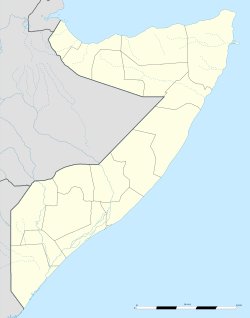
Somalia, officially the Federal Republic of Somalia, is a country in the Horn of Africa. The country is bordered by Ethiopia to the west, Djibouti to the northwest, the Gulf of Aden to the north, the Indian Ocean to the east, and Kenya to the southwest. Somalia has the longest coastline on Africa's mainland. Its terrain consists mainly of plateaus, plains, and highlands. Hot conditions prevail year-round, with periodic monsoon winds and irregular rainfall. Somalia has an estimated population of around 17.1 million, of which over 2 million live in the capital and largest city Mogadishu, and has been described as Africa's most culturally homogeneous country. Around 85% of its residents are ethnic Somalis, who have historically inhabited the country's north. Ethnic minorities are largely concentrated in the south. The official languages of Somalia are Somali and Arabic. Most people in the country are Muslims, the majority of them Sunni.
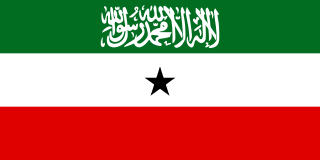
Somaliland, officially the Republic of Somaliland, is a de facto sovereign state in the Horn of Africa, still considered internationally to be part of Somalia. Somaliland lies in the Horn of Africa, on the southern coast of the Gulf of Aden. It is bordered by Djibouti to the northwest, Ethiopia to the south and west, and Somalia to the east. Its claimed territory has an area of 176,120 square kilometres (68,000 sq mi), with approximately 5.7 million residents as of 2021. The capital and largest city is Hargeisa. The government of Somaliland regards itself as the successor state to British Somaliland, which, as the briefly independent State of Somaliland, united in 1960 with the Trust Territory of Somaliland to form the Somali Republic.
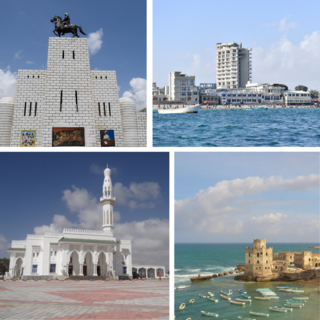
Mogadishu, locally known as Xamar or Hamar, is the capital and most populous city of Somalia. The city has served as an important port connecting traders across the Indian Ocean for millennia, and has an estimated population of 2,388,000 (2021). Mogadishu is located in the coastal Banadir region on the Indian Ocean, which unlike other Somali regions, is considered a municipality rather than a maamul goboleed.

The Horn of Africa (HoA), also known as the Somali Peninsula, is a large peninsula and geopolitical region in East Africa. Located on the easternmost part of the African mainland, it is the fourth largest peninsula in the world. It is composed of Ethiopia, Eritrea, Somalia and Djibouti; broader definitions also include parts or all of Kenya, Sudan, South Sudan, and Uganda. The term Greater Horn Region (GHR) can additionally include Burundi, Rwanda, and Tanzania. It lies along the southern boundary of the Red Sea and extends hundreds of kilometres into the Guardafui Channel, Gulf of Aden, and Indian Ocean and shares a maritime border with the Arabian Peninsula of Western Asia.
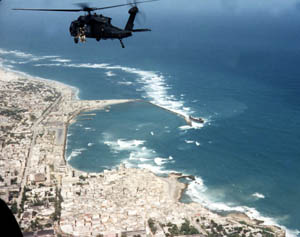
The Battle of Mogadishu, also known as the Black Hawk Down incident, was part of Operation Gothic Serpent. It was fought on 3–4 October 1993, in Mogadishu, Somalia, between forces of the United States—supported by UNOSOM II—against the forces of the Somali National Alliance (SNA) and citizens of south Mogadishu. The battle was part of the broader Somali Civil War that had begun in 1991. The United Nations had initially become involved to provide food aid to alleviate starvation in the south of the country, but in the months preceding the battle, had shifted the mission to establishing democracy and restoring a central government.
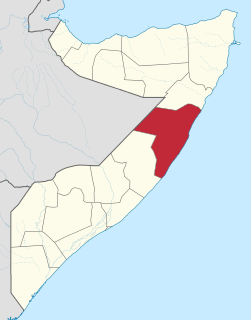
Mudug is an administrative region (gobol) in north-central Somalia. The population of Mudug is 131,455 as of 2005.

Puntland, officially the Puntland State of Somalia, is a Federal Member State in northeastern Somalia. The capital city is the city of Garoowe in the Nugal region, and its leaders declared the territory an autonomous state in 1998. Geographically to the west, Puntland lays claim to the intra-46th meridian territories that were outside European colonial rule during parts of the Scramble for Africa period.
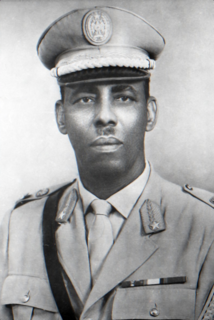
Mohamed Siad Barre was a Somali general who served as the President of the Somali Democratic Republic from 1969 to 1991 and the third overall president of Somalia. He was given the childhood nickname Afweyne roughly referring to extraversion. Barre, a major general of the gendarmerie by profession, became President of Somalia after the 1969 coup d'état that overthrew the Somali Republic following the assassination of President Abdirashid Ali Shermarke. The Supreme Revolutionary Council military junta under Barre reconstituted Somalia as a one-party Marxist–Leninist communist state, renaming the country the Somali Democratic Republic and adopting scientific socialism, with support from the Soviet Union.

Somali is an Afroasiatic language belonging to the Cushitic branch. It is spoken as a mother tongue by Somalis in Greater Somalia and the Somali diaspora. Somali is an official language in Somalia and Ethiopia, and a national language in Djibouti as well as in northeastern Kenya. The Somali language is written officially with the Latin alphabet although the Arabic alphabet and several Somali scripts like Osmanya, Kaddare and the Borama script are informally used.

The Somalis are an ethnic group native to the Horn of Africa who share a common ancestry, culture and history. The Lowland East Cushitic Somali language is the shared mother tongue of ethnic Somalis, which is part of the Cushitic branch of the Afroasiatic language family, and are predominantly Sunni Muslim. They form one of the largest ethnic groups on the African continent, and cover one of the most expansive landmasses by a single ethnic group in Africa.

The Ogaden War, or the Ethio-Somali War, was a military conflict fought between Somalia and Ethiopia from July 1977 to March 1978 over the Ethiopian region of Ogaden. Somalia's invasion of the region, precursor to the wider war, met with the Soviet Union's disapproval, leading the superpower to end its support of Somalia and support Ethiopia instead.

The Isaaq is a Somali clan. It is one of the major noble Somali clans in the Horn of Africa, with a large and densely populated traditional territory.

The Somali Civil War is an ongoing civil war that is taking place in Somalia. It grew out of resistance to the military junta which was led by Siad Barre during the 1980s. From 1988 to 1990, the Somali Armed Forces began engaging in combat against various armed rebel groups, including the Somali Salvation Democratic Front in the northeast, the Somali National Movement in the northwest, and the United Somali Congress in the south. The clan-based armed opposition groups overthrew the Barre government in 1991.

Somali cuisine is the traditional cuisine of Somalis from the Horn of Africa. Somali cuisine does have moderate foreign influence from different countries mainly due to trade but traditionally also varies from region to region due to the expansive landmass Somalis inhabit with traditions varying in different regions which makes it a fusion of differing Somali culinary traditions. It is the product of Somalia's tradition of trade and commerce. Some notable Somali delicacies include Kimis/Sabaayad, Canjeero/Lahoh, Xalwo (Halwa), Sambuusa (Samosa), Bariis Iskukaris, and Muqmad/Odkac.
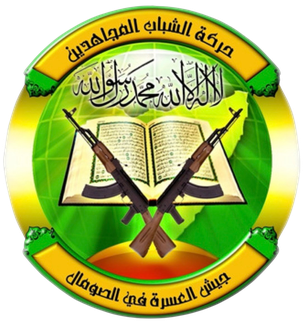
Harakat al-Shabaab al-Mujahideen, more commonly known as al-Shabaab, is an Islamic fundamentalist Salafi jihadist group which is based in Somalia and active elsewhere in East Africa. It is actively involved in the ongoing Somali Civil War. Even though its membership incorporates Somali nationalist elements, al-Shabaab's central aims are Salafi jihadist. Allegiant to the militant pan-Islamist organization al-Qaeda since 2012, it has also been suspected of forging ties with Boko Haram, al-Qaeda in the Islamic Maghreb, and al-Qaeda in the Arabian Peninsula.
Piracy off the coast of Somalia occurs in the Gulf of Aden, Guardafui Channel and Somali Sea, in Somali territorial waters and other surrounding areas and has a long and troubled history with different perspectives from different communities. It was initially a threat to international fishing vessels, expanding to international shipping since the consolidation of states phase of the Somali Civil War around 2000.

Djibouti, officially the Republic of Djibouti, is a country in the Horn of Africa, bordered by Somalia to the south, Ethiopia to the southwest, Eritrea in the north, and the Red Sea and the Gulf of Aden to the east. The country has an area of 23,200 km2 (8,958 sq mi).

The Somali Civil War (2009–present) is a phase of the Somali Civil War which is concentrated in southern and central Somalia. It began in late January 2009 with the conflict mainly between the forces of the Federal Government of Somalia assisted by African Union peacekeeping troops and Al-Qaeda aligned Al-Shabaab militants.

Hassan Sheikh Mohamud is a Somali politician who has served as the president of Somalia since May 2022. He is the founder and current chairman of the Union for Peace and Development Party. He was elected as President of the Federal Republic of Somalia on 15 May 2022, defeating the incumbent president Mohamed Abdullahi Mohamed. He previously served in the same position as the 8th president of Somalia from 2012 to 2017. A civil and political rights activist, Hassan was previously a university professor and dean.

On 29 October 2022, 121 people were killed and over 300 were injured by a double car bombing in Somalia's capital, Mogadishu. President Hassan Sheikh Mohamud accused Sunni jihadist group al-Shabaab of carrying out the attacks, which they admitted. The bombing marks the deadliest attack in Somalia since the 14 October 2017 Mogadishu bombings at the same junction.
